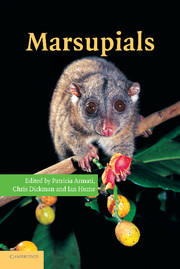Book contents
- Frontmatter
- Contents
- List of Contributors
- Preface
- 1 The evolution and classification of marsupials
- 2 What marsupials can do for genetics and what genetics can do for marsupials
- 3 Reproduction
- 4 Lactation
- 5 Nutrition and digestion
- 6 The nervous system
- 7 The immunolymphatic system
- 8 Ecology and life histories
- 9 Behaviour
- 10 Conservation and management
- References
- Index
- Plate Section
2 - What marsupials can do for genetics and what genetics can do for marsupials
Published online by Cambridge University Press: 07 August 2009
- Frontmatter
- Contents
- List of Contributors
- Preface
- 1 The evolution and classification of marsupials
- 2 What marsupials can do for genetics and what genetics can do for marsupials
- 3 Reproduction
- 4 Lactation
- 5 Nutrition and digestion
- 6 The nervous system
- 7 The immunolymphatic system
- 8 Ecology and life histories
- 9 Behaviour
- 10 Conservation and management
- References
- Index
- Plate Section
Summary
Introduction
There are good reasons to know something about the genetics of marsupials, both from the point of view of genetics, and from the point of view of marsupials. Marsupials represent an independent group of mammals, so they provide a new and rich source of variation that we can use to figure out general principles such as how genes are arranged into a genome, how the genes function, and how they evolved. In turn, these general principles can be pressed into the service of figuring out how marsupials and marsupial populations work, and how we can manage them sensibly and sensitively. In introducing these ideas, we will use many specialised words – to avoid this would be like teaching you to cook without using the words saucepan or water! As we go along, the words will be defined in more detail.
Obviously we know far, far less about marsupial genetics than we do about mouse genetics, let alone human genetics. This is because far fewer people study marsupials, and far, far fewer dollars are spent on them. Yet for four decades there has been quite a tradition of studying genes, and especially chromosomes in marsupials.
True, classic genetics, à la Mendel, has been difficult in marsupials. A few coat colour variants were suspected to be genetic, but there was little in the way of pedigree data to confirm this.
- Type
- Chapter
- Information
- Marsupials , pp. 22 - 82Publisher: Cambridge University PressPrint publication year: 2006
- 2
- Cited by

